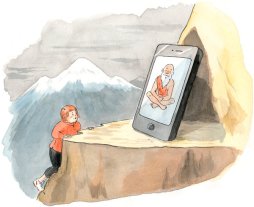By Tracy Dennis.
I was very interested to read this funny take on psychology smartphone apps in the New York Times (by Judith Newman) – or more accurately, how NOT to build a psychology app. I just blogged about this general topic in my last post, and what struck me most about this article was the notion of time.
Art by Emily Flake (published in the New York Times 4/5/2013)
This article seems to suggest that mental health apps should quickly and effortlessly facilitate our relationships, efficiency, and well-being. As Newman writes in the article: ”All of these apps require thought. Lots and lots of thought. Thinking is what I do all day long. I needed something that would turn my mind off, not on.”
Great point. Maybe we don’t want the app to be our shrink – because when we go to a therapist, we tend to have a set of expectations that involve spending a good deal of time and energy (unless we’re just looking for a medication fix). Apps, by their nature, are fast, easy, and mobile. So, most of us expect that a psychology app will be a shortcut to mental health. We shouldn’t have to spend time learning how to use the app or being on it too much – at least not so much that it’s taking away from “having a life.”
This view tells me that there is a potentially deep disconnect here: between what many of us in the mental health field think of as the promise of mobile health technologies and what everyone else thinks. Many psychologists see a future in which apps and computerized therapeutic tools break down barriers to treatment, which can be too expensive and intensive for many. For example, for the most common class of psychiatric disorder, the anxiety disorders, only about 20% of anxious people receive treatment! So, the psychologists are thinking, jeez, mobile technologies offer so many amazing possibilities for integrating mental health treatment into the daily life of people who are suffering. Let’s create an app for that!
But we need to think through our approach carefully. If we just put the same old (frankly boring) computerized interventions on smartphones, will that actually help us reach more people? How many will choose to use these tools? Maybe some, but perhaps not many. Perhaps what most of us want from an app is the digital and interactive version of the self-help book – you can take it or leave it, pick it up and put it down after a few minutes and still get something from it, and which doesn’t feel like just another source of techno-burden.
So, what is the take-home message for the mental health professionals? Make it fun, make it fast, and make it effective or get back to work on making traditional treatments better.
Original Link: http://psychescircuitry.wordpress.com/2013/04/06/appily-ever-after/



